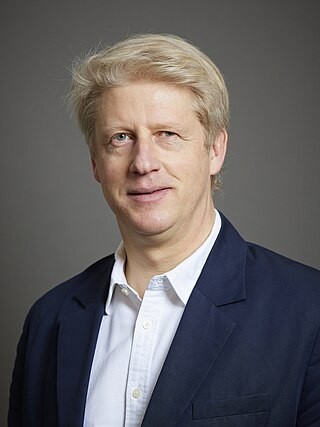Related Research Articles

David Linsay Willetts, Baron Willetts, is a British politician and life peer. From 1992 to 2015, he was the Member of Parliament representing the constituency of Havant in Hampshire. He served as Minister of State for Universities and Science from 2010 until July 2014 and became a member of the House of Lords in 2015. He was appointed chair of the UK Space Agency's board in April 2022. He is president of the Resolution Foundation.

The Institute for Fiscal Studies (IFS) is an independent economic research institute based in London, United Kingdom, which specialises in UK taxation and public policy. It produces both academic and policy-related findings.
The Cabinet of Australia, also known as the Federal Cabinet, is the chief decision-making body of the executive branch of the federal government of Australia. The cabinet is appointed by the prime minister of Australia and is composed of senior government ministers who head the executive departments and ministries of the federal government, this often includes assistant ministers and a number of special envoys and other government advisors. The cabinet is separate to the federal Department of the Prime Ministers and Cabinet.
Biotechnology and Biological Sciences Research Council (BBSRC), part of UK Research and Innovation, is a non-departmental public body (NDPB), and is the largest UK public funder of non-medical bioscience. It predominantly funds scientific research institutes and university research departments in the UK.
The Engineering and Physical Sciences Research Council (EPSRC) is a British Research Council that provides government funding for grants to undertake research and postgraduate degrees in engineering and the physical sciences, mainly to universities in the United Kingdom. EPSRC research areas include mathematics, physics, chemistry, artificial intelligence and computer science, but exclude particle physics, nuclear physics, space science and astronomy. Since 2018 it has been part of UK Research and Innovation, which is funded through the Department for Business, Energy and Industrial Strategy.
Sir Gareth Gwyn Roberts was a Welsh physicist specialising in semiconductors and molecular electronics, who was influential in British science policy through his chairmanship of several academic bodies and his two reports on the future supply of scientists and how university research should be assessed. He was knighted in 1997 for his services to higher education.

Research Councils UK, sometimes known as RCUK, was a non-departmental public body that coordinated science policy in the United Kingdom from 2002 to 2018. It was an umbrella organisation that coordinated the seven separate research councils that were responsible for funding and coordinating academic research for the arts, humanities, science and engineering. In 2018 Research Councils transitioned into UK Research and Innovation (UKRI).
The Economic and Social Research Council (ESRC), formerly the Social Science Research Council (SSRC), is part of UK Research and Innovation (UKRI). UKRI is a non-departmental public body (NDPB) funded by the UK government. ESRC provides funding and support for research and training in the social sciences. It is the UK's largest organisation for funding research on economic and social issues.
Research Quality Framework (RQF) was a component of Backing Australia's Ability, an initiative of the Australian Government to formulate a best practice framework for assessing research quality and the impact of research, and ensure that public funding was being invested in research which would deliver real benefits to the wider community. RQF was to bring public funding of research in line with government policy for funding to be determined by outcomes achieved.

University Alliance (UA) is an association of British universities formed in 2006 as the Alliance of Non-Aligned Universities, adopting its current name in 2007.

Dame Patricia Anne Hodgson, is a British broadcasting executive, competition regulator, and academic administrator.

Joseph Edmund Johnson, Baron Johnson of Marylebone, is a British politician and peer who was Minister of State for Universities, Science, Research and Innovation from 2015 to 2018, and from July to September 2019. A member of the Conservative Party, he was Member of Parliament (MP) for Orpington from 2010 to 2019. He currently sits in the House of Lords. His older brother, Boris Johnson, was Prime Minister of the United Kingdom between 2019 and 2022.
University Grants Committee was an advisory committee of the British government, which advised on the distribution of grant funding amongst the British universities. It was in existence from 1919 until 1989. Its functions have now largely been taken over by the higher education funding councils.
The Research Excellence Framework (REF) is a research impact evaluation of British Higher Education Institutions (HEIs). It is the successor to the Research Assessment Exercise and it was first used in 2014 to assess the period 2008–2013. REF is undertaken by the four UK higher education funding bodies: Research England, the Scottish Funding Council (SFC), the Higher Education Funding Council for Wales (HEFCW), and the Department for the Economy, Northern Ireland (DfE).

The Ministry of Education (MoE) is a ministry of the Government of India, responsible for the implementation of the National Policy on Education. The ministry is further divided into two departments: the Department of School Education and Literacy, which deals with primary, secondary and higher secondary education, adult education and literacy, and the Department of Higher Education, which deals with university level education, technical education, scholarships, etc.
The UK Data Service is the largest digital repository for quantitative and qualitative social science and humanities research data in the United Kingdom. The organisation is funded by the UK government through the Economic and Social Research Council and is led by the UK Data Archive at the University of Essex, in partnership with other universities.
Research funding in the United Kingdom is divided mainly among Non-Departmental Government Bodies: UK Research and Innovation ('UKRI'), and 'Higher Education Funding Bodies'. The budgets of both the UK Research Councils and the Higher Education Funding Bodies budgets were set by the Department for Business, Innovation and Skills prior to 2016, at which point Department was succeeded by the Department for Business, Energy and Industrial Strategy. UK research funding follows the government policy, the 'Haldane principle', this means research is evaluated by scientists themselves through peer review, not politicians.

The Higher Education and Research Act 2017 was enacted into law in the United Kingdom by the Houses of Parliament on 27 April 2017. It is intended to create a new regulatory framework for higher education, increase competition and student choice, ensure students receive value for money, and strengthen the research sector.
UK Research and Innovation (UKRI) is a non-departmental public body of the Government of the United Kingdom that directs research and innovation funding, funded through the science budget of the Department for Science, Innovation and Technology.
Ben Ramalingam is a British researcher, strategist, innovator and author, currently Director of Strategy at British Red Cross, senior research associate at the Overseas Development Institute Politics and Governance programme and advisor to the OECD Development Assistance Committee on innovation investments for development, humanitarian and human rights issues.
References
- ↑ The Guardian website, Labour Steps Into Row Over ‘Big Society’ Research, article by Shiv Malik, dated June 20, 2011
- 1 2 3 4 The British Academy website, Chronology
- 1 2 Higher Education and Research Act 2017, legislation.gov.uk
- 1 2 Institute For Government website, The Haldane Report: the next 100 years
- ↑ UK Research And Innovation website, Our relationship with the government, updated February 27, 2023’’
- ↑ "House of Commons Hansard Ministerial Statements for 20 Dec 2010 (pt 0001)". publications.parliament.uk. Retrieved 2020-03-16.
- ↑ UKRI website, UK government Department for Business, Energy & Industrial Strategy: UKRI Framework Document, page 60, published May 2018
- ↑ BBC 24 02 2017: Minister to enshrine protection for research independence
- ↑ UKRI website, Who We Are
- ↑ University Of Melbourne website, Australian Research Council Amendment (Ensuring Research Independence) Bill 2018, page 3 (submitted February 25, 2022)
- ↑ Guardian newspaper website, International Researchers Shun Australia After Government Vetoing Of Grants, expert says, article by Donna Dlu, dated March 9, 2022